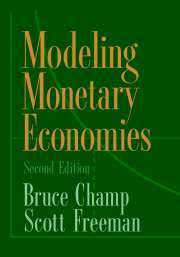Part I - Money
Summary
IN PART I we develop and learn to work with our most basic model of money, applying it to the study of fiat and commodity monies, inflation, and international monetary systems. In studying each of these topics, we will examine how money can facilitate trade and we will ask which form of money or system of exchange does so most efficiently.
Chapter 1 begins with a simple model of money designed to answer the most basic question in monetary economics: Why do people use money? Why do people value pieces of paper that cannot be consumed? With this model, we discover that intrinsically worthless pieces of paper can have value by providing a means by which individuals can acquire goods that they do not possess. Because of this, we also find that the introduction of money into an economy improves welfare. The model of Chapter 1 serves as the foundation on which we later build more complex models.
Chapter 2 considers two alternatives to the paper money of Chapter 1 – barter and commodity money. This chapter first presents a model that demonstrates, in a multiple good model, why barter, the direct trade of goods owned for goods desired, may be more costly than monetary exchange, the trade of goods owned for money and the subsequent trade of money for goods desired. Chapter 2 also demonstrates that commodities may be exchanged as monies. We will ask which commodities make the best monies and we will compare the efficiency of exchange with commodity money to exchange with fiat money.
- Type
- Chapter
- Information
- Modeling Monetary Economies , pp. 1 - 2Publisher: Cambridge University PressPrint publication year: 2001
- 1
- Cited by



